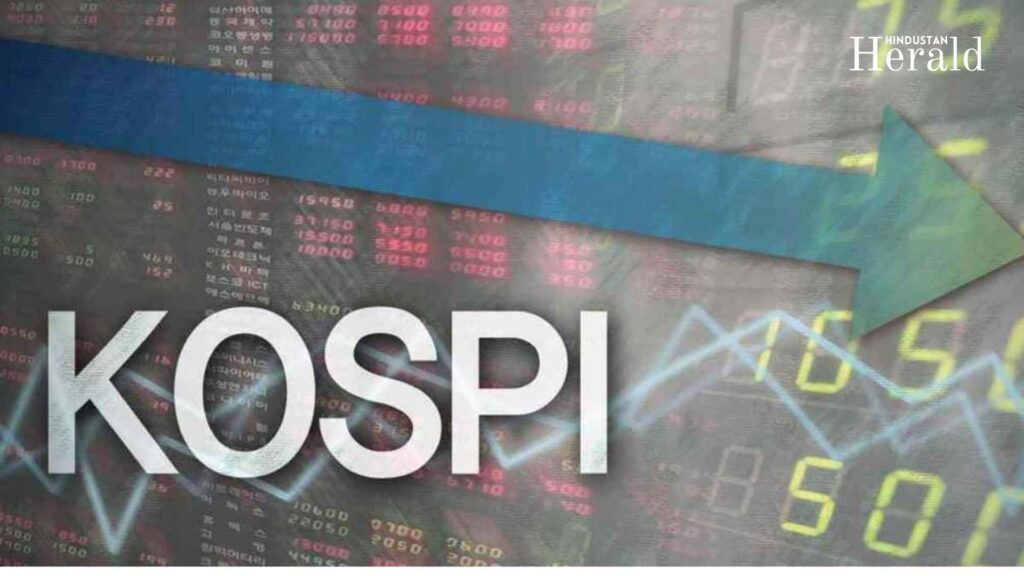
Key Highlights:
South Korea’s benchmark stock index Kospi experienced volatile swings on Friday following the Constitutional Court’s landmark decision to uphold the impeachment of President Yoon Suk Yeol. What began as a brief surge in market sentiment quickly reversed as investors grappled with the implications of political instability, economic uncertainty, and global trade tensions.
The market’s reaction was a vivid reflection of the anxious mood across Seoul’s financial district, as the country navigates through one of its most critical constitutional moments in recent history.
Market Opens Low Amid Global Pressure
The Kospi opened more than 1 percent lower on Friday compared to Thursday’s close, amid growing global uncertainty triggered by U.S. President Donald Trump’s sweeping tariff announcement. The sentiment was already fragile when South Korean markets opened, with global equity pressures weighing on investor confidence.
But by 11:13 a.m., as it became clear that the Constitutional Court would uphold the impeachment of President Yoon, the index mounted a dramatic comeback, reaching 2,506.71, up 0.8% from the previous session’s close.
A Brief Surge as Impeachment Becomes Reality
The initial market rally was largely driven by a relief sentiment. Investors interpreted the court’s decisive 22-minute ruling as a step toward clarity in leadership, potentially reducing political uncertainty. The court had ruled that President Yoon had violated constitutional law by imposing martial law without parliamentary approval on December 3 — a move deemed illegal by all nine constitutional judges.
By 11:22 a.m., the moment the impeachment was confirmed, the market’s immediate reaction was positive, seen as a potential reset for democratic norms in Korea.
Sharp Reversal Amid Rising Political and Economic Concerns
However, the relief was short-lived. Within 40 minutes, the Kospi plummeted back, falling to 2,462.74 at 11:56 a.m., a sharp 96-point reversal from the day’s high. The index ended the session down 23.95 points, or 0.96%, signaling a renewed wave of investor caution.
Market analysts attributed the drop to a mix of factors:
- Heightened political uncertainty over who will lead the country in the interim.
- Concerns about policy paralysis during the transitional period.
- A global equity retreat led by fears of new U.S. tariffs on Asian economies.
- Weakened currency pressures, with the won-dollar rate continuing to fall.
Won Weakens Further as Dollar Gains on Trade Moves
The Korean won also showed signs of strain, largely due to broader dollar strength driven by the Trump administration’s latest tariff policy. The won, which had already opened sharply lower, slipped further to the 1,436.30 level by 11:22 a.m..
Currency traders noted that the greenback’s surge was fueled by market expectations of protectionist U.S. trade measures, sparking concern over a potential slowdown in Korean exports. The weakness of the won raised red flags about import inflation, potentially impacting domestic consumption in the weeks ahead.
The Political Fallout and Investor Sentiment
President Yoon’s impeachment marks the second time in South Korea’s history that a sitting president has been removed from office through constitutional proceedings, after Park Geun-hye in 2017. While the move was welcomed by democratic institutions, it also opens the door to short-term instability.
Economists warn that legislative deadlocks, cabinet reshuffles, and the absence of executive decision-making during the interim government period may delay key economic reforms and budget approvals.
“Investors are moving to the sidelines until we have a clear roadmap for leadership transition,” said Kim Hyun-tae, head of equities at Seoul-based Daesung Securities. “Markets don’t like uncertainty, and this moment is filled with it — from trade policy to domestic governance.”
Sectoral Breakdown: Who Gained, Who Lost
Gainers (During the Brief Rally)
- Green energy and infrastructure stocks gained on optimism that Yoon’s removal could revive stalled clean energy projects.
- Financials and insurance firms also saw a modest uptick, as clarity in court ruling was seen as reducing long-term legal risk.
Losers (Post-Impeachment Decline)
- Technology and export-heavy stocks, especially chipmakers and auto giants, declined due to fears over U.S. tariffs and slowing overseas demand.
- Defense stocks, which had surged after martial law rumors in December, tumbled following Yoon’s official removal.
Foreign Investors: Exit or Entry?
Despite the volatility, foreign institutional investors remained net sellers, concerned not only about Korea’s domestic turbulence but also about escalating U.S.-China economic tensions, which have a direct impact on Korea’s export-heavy economy.
However, some long-term investors saw the drop as a buying opportunity, betting on a return to stability and reform.
“We’re in for a bumpy few weeks, but Korea’s fundamentals remain strong,” said Nathan Li, an Asia strategist at HSBC Global Markets. “If a strong interim leadership emerges, and global trade stabilizes, the Kospi could recover quickly.”
What’s Next for Kospi?
The Kospi’s future trajectory depends on a few critical developments:
- Who takes interim leadership and how swiftly that government addresses investor and public confidence.
- The pace of policy normalization, particularly on economic reforms stalled under President Yoon.
- The external macroeconomic climate, including Trump’s evolving tariff plans, and reactions from China and the EU.
- Corporate earnings season, which begins next week and could bring fundamental direction back to equity movements.
A Turning Point for Korea and Kospi
The Kospi’s wild Friday ride is a testament to the deep interlink between politics and markets. In the span of a few hours, it reflected hope, resilience, and renewed anxiety, as South Korea once again finds itself navigating an unprecedented political shift.
As the dust settles on President Yoon’s impeachment, all eyes will be on the interim government’s first steps — and how the Kospi responds to what could be a defining moment for Korea’s democracy and its economy.
The Hindustan Herald Is Your Source For The Latest In Business, Entertainment, Lifestyle, Breaking News, And Other News. Please Follow Us On Facebook, Instagram, Twitter, And LinkedIn To Receive Instantaneous Updates. Also Don’t Forget To Subscribe Our Telegram Channel @hindustanherald
